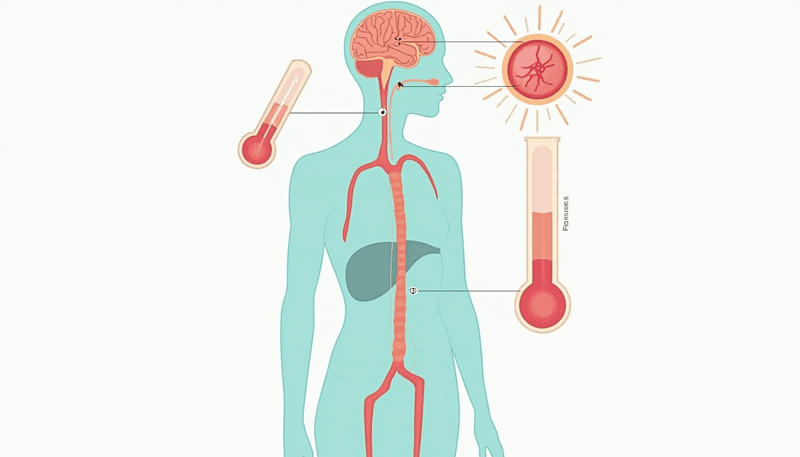Making Peace With Menopause Hot Flashes

Have you ever woken up in the middle of the night, sheets drenched, wondering if your bedroom somehow transformed into a sauna? You're not alone. As a health writer and someone who's witnessed my own mother's journey through menopause, I understand how overwhelming these experiences can be. Let's explore the latest evidence-based guidelines for managing menopausal symptoms, particularly those pesky hot flashes.
Understanding Your Body's Changes
First, let's normalize what's happening. Vasomotor symptoms (fancy medical speak for hot flashes and night sweats) affect most women during menopause. It's like your body's internal thermostat getting a software update – sometimes it works perfectly, other times it goes haywire.
"Why do some women barely notice these changes while others feel like they're living in a constant heat wave?"
The intensity and frequency of hot flashes vary greatly among women. Some might experience mild warming sensations, while others face severe episodes that disrupt their daily lives. Think of it as your body adjusting to a new normal, much like how your smartphone sometimes needs time to adapt after a major update.
The Science-Backed Solution: Hormone Therapy
When it comes to managing hot flashes, hormone therapy remains the gold standard for women under 60 or within 10 years of menopause onset. Here's what you need to know:
- Safety First: Research shows hormone therapy is safe for most women when started at the right time
- Personalized Approach: Your treatment plan should be as unique as your fingerprint
- Options Available: Different forms include pills, patches, and creams
I remember Sarah, a regular reader of my health column, who was initially terrified of hormone therapy due to outdated information she'd read online. After discussing the current evidence with her healthcare provider, she started a personalized treatment plan that transformed her quality of life.
"What fears or misconceptions might be holding you back from discussing hormone therapy with your healthcare provider?"
Beyond Hormones: Alternative Approaches
Not everyone can or wants to use hormone therapy. Here are evidence-based alternatives:
-
Prescription Medications:
- Certain antidepressants
- Gabapentinoids
- Clonidine
- Oxybutynin
-
Cognitive Behavioral Therapy (CBT):
- Emerging research shows promising results
- Helps manage both physical symptoms and emotional responses
- Can be combined with other treatments
-
Lifestyle Modifications:
- Nutrition: Focus on whole foods and regular meals
- Exercise: Regular physical activity helps regulate body temperature
- Stress Management: Incorporate relaxation techniques
The Truth About Natural Remedies
While many women are interested in natural health products, the scientific evidence for their effectiveness is limited. This doesn't mean they don't work – it means we need more research. If you're considering natural remedies:
- Do Your Research: Look for products with quality testing
- Discuss with Healthcare Providers: Some supplements can interact with medications
- Monitor Your Response: Keep a symptom diary to track effectiveness
"Have you tried any natural remedies? What has been your experience?"
Making Informed Choices
Your menopause journey is unique. The best approach combines:
- Education: Stay informed about current research
- Open Communication: Regular discussions with healthcare providers
- Self-Advocacy: Trust your experiences and speak up about your needs
- Lifestyle Balance: Focus on overall wellness, not just symptom management
Moving Forward
Hot flashes and other menopausal symptoms don't have to control your life. Whether you choose hormone therapy, alternative treatments, or a combination approach, evidence-based options exist to help you feel more comfortable and confident.
Take the first step today: Schedule an appointment with your healthcare provider to discuss your symptoms and create a personalized management plan.
Your turn: What's one action you can take this week to better manage your menopausal symptoms? Share your thoughts and experiences – your story might help someone else on their journey.

Amelia Grace Okonkwo
Amelia Grace Okonkwo is a freelance health writer and author with over 15 years of experience in health journalism, specializing in women's health and autoimmune disorders. With a background in biology and a Master’s in Public Health from Johns Hopkins, she combines scientific accuracy with a storytelling approach to make health information accessible and empowering. Amelia is known for her bestselling book, "The Skin We're In," which explores autoimmune disorders and their impact. She is passionate about delivering practical health insights for women, addressing topics from midlife wellness to mental health.






